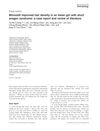 3 citations,
December 2019 in “Journal of Cosmetic and Laser Therapy”
3 citations,
December 2019 in “Journal of Cosmetic and Laser Therapy” PRGF treatments increased hair number and thickness in people with hair loss, with more injections leading to better results.
 3 citations,
March 2018 in “Journal of Continuing Education in Nursing”
3 citations,
March 2018 in “Journal of Continuing Education in Nursing” Continuing education programs significantly increased rural nurse practitioners' knowledge about PCOS.
 3 citations,
January 2018 in “International Journal of Cosmetic Science”
3 citations,
January 2018 in “International Journal of Cosmetic Science” Hair stiffness increased by 13.2% after caffeine treatment, validating the Stiffness-Angle Law as an effective measurement method.
 3 citations,
July 2016 in “International Journal of Dermatology”
3 citations,
July 2016 in “International Journal of Dermatology” Minoxidil treatment increased hair density in a young Asian girl with short anagen syndrome, but didn't improve hair length or thickness.
3 citations,
April 2002 in “Animal Science” Spermidine injections increased wool growth rate in lambs without changing fibre thickness.
 2 citations,
December 2021 in “Dermatology Online Journal”
2 citations,
December 2021 in “Dermatology Online Journal” COVID-19 has increased hair loss, but many patients see regrowth within months.
 2 citations,
September 2021
2 citations,
September 2021 The COVID-19 pandemic increased the use of teledermatology to treat skin conditions in low-income areas, despite challenges like poor photo quality.
 2 citations,
April 2018 in “Journal of Investigative Dermatology”
2 citations,
April 2018 in “Journal of Investigative Dermatology” Frontal fibrosing alopecia shows increased inflammation and JAK-STAT pathway activity without reduced hair proteins.
 1 citations,
January 2023 in “Brazilian Journals Editora eBooks”
1 citations,
January 2023 in “Brazilian Journals Editora eBooks” Children's screen time increased during the pandemic, causing various health issues.
1 citations,
January 2018 in “The Open Dermatology Journal” Spironolactone may cause increased brain pressure in some patients.
 1 citations,
August 2017 in “Journal of food and nutrition research”
1 citations,
August 2017 in “Journal of food and nutrition research” The herbal supplement increased hair thickness and reduced scalp oiliness in women.
 1 citations,
April 2017 in “Journal of Investigative Dermatology”
1 citations,
April 2017 in “Journal of Investigative Dermatology” D-OCT shows increased blood vessel growth in response to tissue damage in Frontal Fibrosing Alopecia and is useful for diagnosis and monitoring.
1 citations,
June 2016 in “FEBS open bio” Fish oil increased cell growth and macrophages in the skin but didn't affect COX-2 expression.
 1 citations,
November 2010 in “Value in Health”
1 citations,
November 2010 in “Value in Health” Pill splitting increased generic finasteride sales but didn't affect branded finasteride sales.
 1 citations,
January 2007 in “Jounal of The Korean Society of cosmetology”
1 citations,
January 2007 in “Jounal of The Korean Society of cosmetology” Hair loss treatments increased hair density and reduced hair loss in most men, but didn't improve hair thickness for everyone.
 September 2024 in “JAAD International”
September 2024 in “JAAD International” Telogen effluvium increased globally after COVID-19, especially in Asian and Latin regions.
 September 2024 in “Clinical and Experimental Dermatology”
September 2024 in “Clinical and Experimental Dermatology” COVID-19 increased hair loss cases, but vaccination did not.
 September 2024 in “Journal of the American Academy of Dermatology”
September 2024 in “Journal of the American Academy of Dermatology” Media attention increased oral minoxidil prescriptions for English-preferring patients but not for Spanish-preferring patients.

Alopecia areata patients show increased inflammation and OX40 activation, suggesting a new treatment target.

The combined treatment increased hair density in most patients with Androgenetic Alopecia.
 March 2024 in “International Journal of Cosmetic Science”
March 2024 in “International Journal of Cosmetic Science” Dandruff is linked to increased T cells and weakened immune protection in hair follicles.
 February 2024 in “Bangladesh pharmaceutical journal”
February 2024 in “Bangladesh pharmaceutical journal” The herbal hair oil increased hair growth and reduced hair fall for most users without significant side effects.
 December 2023 in “Journal of Drugs in Dermatology”
December 2023 in “Journal of Drugs in Dermatology” Media coverage increased public interest in oral minoxidil for hair loss but may also spread misinformation.
 November 2023 in “Cureus”
November 2023 in “Cureus” Magnetized saline water lotion increased hair growth in men with hair loss.
 October 2023 in “Journal of the Endocrine Society”
October 2023 in “Journal of the Endocrine Society” A woman's increased facial hair and hair loss were caused by a rare ovarian tumor, cured by surgery.
 September 2023 in “International Journal of Cosmetic Science”
September 2023 in “International Journal of Cosmetic Science” Both shampoos increased scalp germ numbers but did not change the overall microbial community composition.
 April 2023 in “Acta Poloniae Pharmaceutica”
April 2023 in “Acta Poloniae Pharmaceutica” Herbal extract shampoo increased certain minerals in hair and improved hair growth and scalp health.
 November 2022 in “PubMed”
November 2022 in “PubMed” The COVID-19 pandemic increased some stress-related skin diseases but didn't affect others.
 June 2022 in “Research, Society and Development”
June 2022 in “Research, Society and Development” COVID-19 may cause increased hair loss, but the exact reason is unclear and standard hair loss treatments are recommended.
 August 2021 in “Research, Society and Development”
August 2021 in “Research, Society and Development” Minoxidil slightly increased hair volume more than Finasterida, but both reduced hair loss similarly.



























